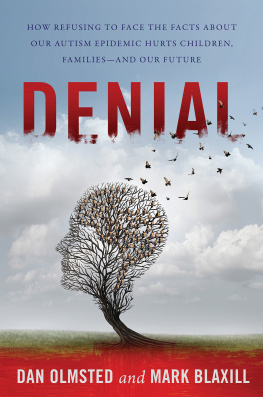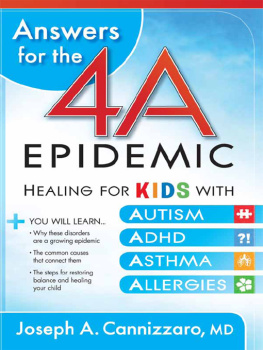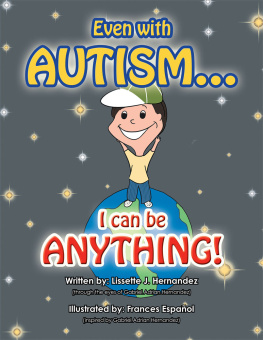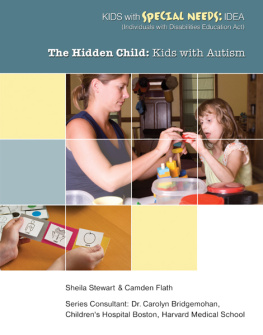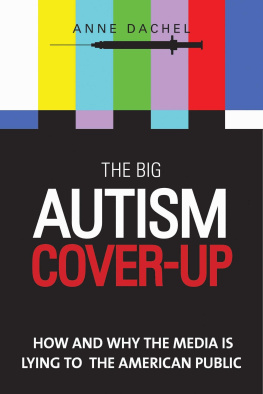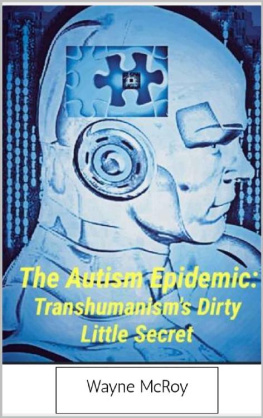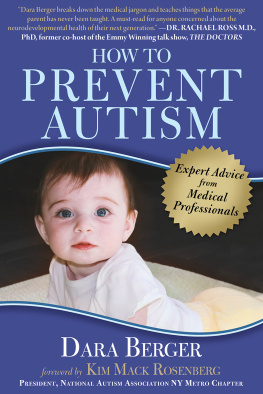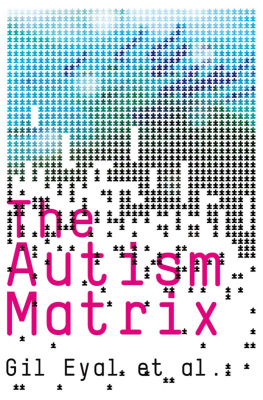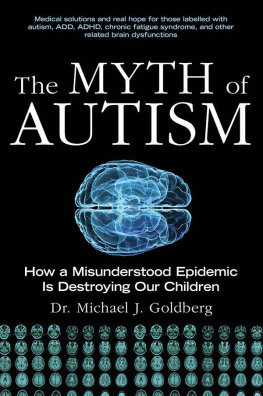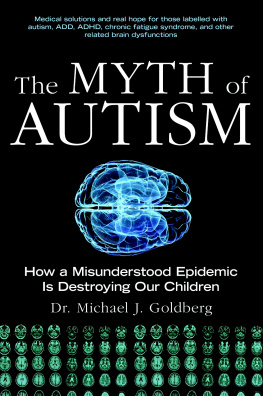Also by Dan Olmsted and Mark Blaxill
The Age of Autism: Mercury, Medicine, and a Man-made Epidemic
Vaccines 2.0: The Careful Parents Guide to Making Safe Vaccination Choices For Your Family
By Mark Blaxill
The Invisible Edge: Taking Your Strategy to the Next Level Using Intellectual Property
DEDICATION
To Bernard Rimland
Who sought the truth and helped sick kids
Copyright 2017 by Dan Olmsted and Mark Blaxill
All rights reserved. No part of this book may be reproduced in any manner without the express written consent of the publisher, except in the case of brief excerpts in critical reviews or articles. All inquiries should be addressed to Skyhorse Publishing, 307 West 36th Street, 11th Floor, New York, NY 10018.
Skyhorse Publishing books may be purchased in bulk at special discounts for sales promotion, corporate gifts, fund-raising, or educational purposes. Special editions can also be created to specifications. For details, contact the Special Sales Department, Skyhorse Publishing, 307 West 36th Street, 11th Floor, New York, NY 10018 or .
Skyhorse and Skyhorse Publishing are registered trademarks of Skyhorse Publishing, Inc., a Delaware corporation.
Visit our website at www.skyhorsepublishing.com.
10 9 8 7 6 5 4 3 2 1
Library of Congress Cataloging-in-Publication Data is available on file.
Cover design by Rain Saukas
Print ISBN: 9781510716940
Ebook ISBN: 9781510716957
Printed in the United States of America
Contents
Over half of all American children now suffer from chronic illnesses in numbers unheard of just a few short years ago. The fact that this is not the biggest story in America is proof of the willful ignorance of government and main stream media.
Rob Schneider, actor
____________
Dramatis Personae
Autism Discoverers
1. Leo Kanner, child psychiatrist at Johns Hopkins Hospital in Baltimore and author of the 1943 paper, Autistic Disturbances of Affective Contact, that first described eleven children with what came to be known as early infantile autism.
2. Hans Asperger, pediatrician in Vienna and author of the 1944 paper, Autistic Pathology in Childhood. It contained four case histories of what came to be known as Aspergers syndrome.
Psychiatry Pioneers
1. Emil Kraepelin, German founder of modern psychiatry who in the late nineteenth century systematized mental illness under affective and psychotic categories, the latter including dementia praecox , a psychotic illness of adolescence and early adulthood.
2. Eugen Bleuler, German psychiatrist who in the early twentieth century renamed dementia praecox schizophrenia and coined the term autismus for the isolated and self-involved trait evident in schizophrenia. The word was later adopted by Kanner and Asperger to describe the extreme isolation of the new disorders they were describing.
3. Adolf Meyer, Kanners mentor at Johns Hopkins, who along with Dr. Esther Richards saw a child, Jane, that Kanner believed was autisticif so, a very early case description.
4. Irwin Lazar, founder and director of the Viennese childrens health clinic where Asperger, Homberger, Frankl, and Weiss worked. Student of Bleuler.
Observers of Childhood Psychoses
1. D. Arn van Krevelen, Dutch psychiatrist and early observer of autism and Aspergers, which, he argued, were distinct syndromes.
2. Theodor Heller, discoverer of what is now called Childhood Disintegrative Disorder in Vienna in 1907. Often called Hellers disease, Heller-Weygandt syndrome, or dementia infantilis .
3. Wilhelm Weygandt, who saw one of Hellers patients, a four-year-old boy, and wrote about it in a Viennese medical journal in 1907.
4. Sante De Sanctis, Italian doctor who described a disorder similar to Heller-Weygandts he called dementia praecocisemia .
5. Julius Zappert, leading Viennese child psychiatrist who confirmed Hellers observations of rare cases of childhood disintegrative disorders throughout Europe.
6. Grunya Sukhareva, Russian psychiatrist who observed schizoid (eccentric) children in Moscow in the 1920s in what appears to be the earliest description of Little Professor or Asperger-type children.
7. Georg Frankl, chief diagnostician in the Vienna clinic who came to the United States and helped examine Case 1, Donald T., in Leo Kanners landmark paper. Silberman speculates Frankl told Kanner about Aspergers autism discoveries and Kanner stole them.
8. Anni Weiss, doctor in Vienna clinic who, in 1936, described a child, Gottfried, who may have been first Little Professor case reported in Europe. Married Frankl in the United States after both fled the Nazis.
9. Franz Hamburger, head of the University Hospital of Vienna; Aspergers boss with Nazi sympathies who may nevertheless have shielded him from the Nazis.
10. August Homburger, Viennese psychiatrist who wrote a text on childhood psychiatric conditions but mentioned only Weygandt and Heller, not a syndrome similar to autism.
11. Howard Potter, American psychiatrist who wrote a definitive article on childhood schizophrenics in 1933 that contained no mention of a condition comparable to early infantile autism.
12. E. E. Grebelskaya-Albatz, Russian psychiatrist who reported in mid-1930s on cases of Hellers and early-onset schizophrenia but no syndrome similar to autism.
13. Jakob Lutz, wrote case description of Otto, born in 1923. His symptoms began early enough to be consistent with autism, but other features did not match. Lutz called it an insidiously progressive early form of childhood psychosis.
14. Herbert Jancke, German doctor who in 1929 presented a case history called Girl of a child who regressed before age two.
15. N. Moritz Tramer, author of multipart Diary About a Mentally Ill Child, based on his mothers diaries, perhaps the most complete account of regression in infancy. The child, known as P, might have had any number of conditions, possibly including mercury poisoning from gray powder used to treat diarrhea.
16. Lightner Witmer, Philadelphia psychiatrist who wrote in 1920 about a child, Don, with symptoms that autism pioneer Bernard Rimland considered autistic; but post-pertussis encephalitis in infancy is alternate explanation.
17. Mildred Creak, British doctor who wrote about Psychoses in Children in 1937; nothing resembling autism is cited.
18. R. A. Q. Lay, London doctor whose review paper on Psychoses in Children in 1938 is the most exhaustive account of childhood mental illnesses up to that date (the same year the first autistic child, Donald T., was seen at Kanners Baltimore clinic). Serves as bulwark against the idea that syndromes similar to autism had always been around.
19. Esther Richards, psychiatrist who worked with Kanner and spotted one of his eleven cases, Virginia S., in a home for the feeble-minded. Remarked that she stood out as completely different from others in the home.
20. Louise Despert, New York City Freudian child psychiatrist who took issue with Kanner that his cases represented a new syndrome but eventually concluded they did.
21. Lauretta Bender, whose 1947 paper Childhood Schizophrenia was the first after Kanners 1943 paper to capture children with regression during infancyautism.
22. J. Franklin Robinson, coauthor in 1954 of Children With Restricted Interests, first paper in America to describe children with clear Aspergers syndrome.
23. Louis J. Vitale, coauthor of above paper with J. Franklin Robinson. He and Robinson were doctors at a clinic in Wilkes-Barre, Pennsylvania.

